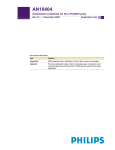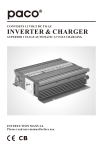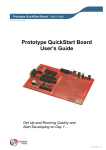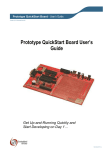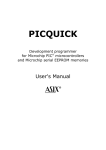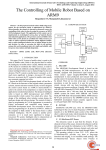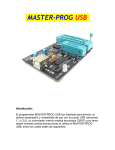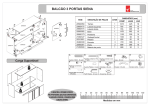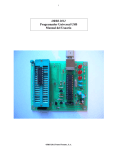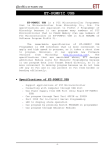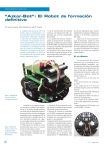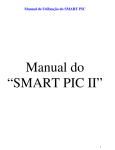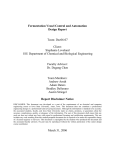Download PIC Microcontroller Universal Board
Transcript
International Journal of Innovative Technology and Exploring Engineering (IJITEE) ISSN: 2278-3075, Volume-3, Issue-7, December 2013 PIC Microcontroller Universal Board Rathod Raju Ambadas, R. P. Chaudhari Abstract- A Microcontroller is a device which integrates a number of the components of a microprocessor system onto a single microchip and optimized to interact with the outside world through on-board interfaces; i.e. it is a little gadget that houses a microprocessor, ROM (Read Only Memory), RAM (Random Access Memory), I/O (Input Output functions), and various other specialized circuits all in one package. Microcontrollers are used in automatically controlled products and devices, such as automobile engine control systems, implantable medical devices, remote controls, office machines, appliances, power tools, toys and other embedded systems. By reducing the size and cost compared to a design that uses a separate microprocessor, memory, and input/output devices, microcontrollers make it economical to digitally control even more devices and processes. Mixed signal microcontrollers are common, integrating analog components needed to control nondigital electronic systems. Keywords- ROM, RAM, I/O. I. INTRODUCTION Based on the experiences with the IPS Board I present here a design for a multi purpose prototyping board for PIC 18F's. Microchip offers a broad range of microcontrollers (PIC's) for various applications. If you use such microcontrollers to develop and prototype solutions it can become cumbersome to design different prototyping boards over and over again depending on the controller used. So made the effort to design a Universal PIC Board UPB where a broad range of different controllers (mostly of the 18F series) can be used. The board offers RS232 (RX,TX including RTS,CTS), USB, a switch, a LED, ICSP, a reset and power monitoring, I2C, external / USB power, power stabilization, connector for alternate power (battery) and power switch and an expansion bus. Design and programming of embedded systems require skills that need training and practice. Usually these activities are performed using a development board equipped with a specific microcontroller and a software environment for firmware development. The main problem of such approach is its focus on only one device type - other microcontroller families require other development boards. This aspect becomes important in a university laboratory, where students have to work with different types of embedded systems Universal Development Tools enable you to develop applications with different types of microcontrollers. These tools provide the same development environment while the microcontroller can be changed easily. The Boards were designed to allow students or engineers to easily exercise and explore the capabilities of the various microcontrollers with peripheral devices such as: ADC, DAC, CAN, Ethernet, IrDA, MP3, RS485 and many more. Manuscript received December, 2013. Rathod Raju Ambadas, M.E. Student and Lect. In Shreeyash College of Engineering and Technology Aurangabad Department of Electronics and Telecommunication, India. R. P. Chaudhari, Associate Professor Department of Electronics and Telecommunication Govt. Engg. College, Aurangabad, India. Diagram of PIC Microcontroller Universal Board Block Diagram Description PIC microcontroller universal Board is a powerful development platform based on PIC18F452, PIC18F252, PIC16F877A and PIC16F84 microcontroller. USB based data logging, real time data monitoring and control, interactive control panels etc. The on-chip USB controller provides direct high speed interface to a PC/ laptop with speeds up to 12Mb/s. The UART boot loader eliminates need of an additional programmer and allows you to program using serial port. The on board peripherals include USB interface, ULN2003 current sinking driver, L293D DC motor controller, 16 X 2 character LCD and many more. The onchip peripherals and the external hardware on the development board are interconnected using pin headers and jumpers. The I/O pins on the microcontroller can be accessed. The board is made from double sided PTH PCB board to provide extra strength to the connector joints for increased reliability. It supports the operating supply voltage between 5V dc and 12 Vac and has built-in reverse polarity protection. Figure: Circuit Diagram of PIC Microcontroller Universal Board II. MAIN THEME PIC microcontroller universal Board is a powerful development platform based on PIC18F452, PIC18F252, PIC16F877A and PIC16F84 PIC microcontroller. This board is ideal for developing embedded applications 120 PIC Microcontroller Universal Board involving high speed wireless communication, USB based data logging, real time data monitoring and control, interactive control panels etc The on-chip USB controller provides direct high speed interface to a PC/ laptop with speeds up to 12Mb/s. The UART boot loader eliminates need of an additional programmer and allows you to program using serial port. Based on the experiences with the IPS Board I present here a design for a multi purpose prototyping board for PIC 18F's. Microchip offers a broad range of microcontrollers (PIC's) for various applications. If you use such microcontrollers to develop and prototype sollutions it can become cumbersome to design different prototyping boards over and over again depending on the controller used That’s why this system made the effort to design a Universal PIC Board UPB where a broad range of different controllers can be used. The board offers RS232 (RX,TX including RTS,CTS), USB, a switch, a LED, ICSP, a reset and power monitoring, I2C, external/USB power, power stabilization, connector for alternate power (battery) and power switch and an expansion bus.. The I/O pins on the microcontroller can be accessed. The board is made from double sided PTH PCB board to provide extra strength to the connector joints for increased reliability. It supports the operating supply voltage between 5V dc and 12 Vac and has built-in reverse polarity protection. Comparison of the System with PIC16F87XA Device Features Key Features PIC 16F873A Operating Frequency DC – 20 MHz PIC 16F874 A DC – 20 MHz Resets (and Delays) POR, BOR (PWRT, OST) POR, BOR (PWRT , OST) Flash Program Memory (14-bit words) Data Memory (bytes) EEPROM Data Memory (bytes) Interrupts I/O Ports 4K Timers Capture/Co mpare /PWM modules Serial Communic ations Parallel Communic ations 10-bit Analog-toDigital Module Analog Comparator s Instruction Set Packages Figure: Developed Universal Board System III. STEP OF EXECUTION PROCESS 1. 2. 3. 4. 5. 6. 7. 8. By PIC Multi programmer burn the code of DC Motor in to the IC by MPLAB Software We have given Ac power supply to transformer, we get step down AC After that we given AC (12V) to Bridge we get 12 V DC We convert that 12 DC Into 5v DC by using IC 7805 That DC 5 v supply is given to the Microcontroller. At port B (RB0 to RB3) we have connected DC motor The positive & negative terminal of motor is connected to VCC & GND (Pin no.32, 31) of microcontroller 18 F452/16F877A After giving power supply to microcontroller DC motor rotates clockwise PIC 16F87 7A DC – 20 MHz POR, BOR (PWR T, OST) 8K Developed System 4K PIC 16F87 6A DC – 20 MHz POR, BOR (PWR T, OST) 8K 192 192 368 368 68 bytes 128 128 256 256 64 bytes 14 Ports A, B, C 15 Ports A, B, C, D, E 14 Ports A, B, C 1 Ports A,B 3 2 3 2 3 2 15 Ports A, B, C, D, E 3 2 MSSP, USART MSSP, USART PSP MSSP, USAR T PSP MSSP, USART — MSSP, USAR T — 5 input channels 8 input channel s 5 input channe ls 8 input channe ls 8 input channels 2 2 2 2 2 35 Instructio ns 28-pin PDIP 28-pin SOIC 28-pin SSOP 28-pin QFN 35 Instruct ions 40-pin PDIP 44-pin PLCC 44-pin TQFP 44-pin QFN 35 Instruc tions 28-pin PDIP 28-pin SOIC 28-pin SSOP 28-pin QFN 35 Instruc tions 40-pin PDIP 44-pin PLCC 44-pin TQFP 44-pin QFN 49 Instruction DC – 20 MHz POR,BOR (PWRT,O ST) 1024 bytes 3 2 - PDIP, SOIC, SSOP As technology advances rapidly comes in modernisation and in an effort to keep the up to date, we developed a PICbased microcontroller design. We believe that this low-cost and reliable laboratory constitutes, for, a smooth transition to the co-design of universal boards. A device, which in testing program phase, can simulate any environment, is called a development system. Apart from the programmer, the power supply unit and the microcontroller socket, the development system contains elements for input pin activation and output pin monitoring. A high quality version has LED displays, LCD displays, temperature sensors and all other elements which the target device can be supplied with. These peripherals could be connected to the MCU. In this way, the whole program may 121 International Journal of Innovative Technology and Exploring Engineering (IJITEE) ISSN: 2278-3075, Volume-3, Issue-7, December 2013 be tested in practice, during its development stage, because the microcontroller does not know, or care, whether its input is activated by a push-button or a sensor built in a real machine. The universal boards result for various applications as follows A. Countdown Timer 7-segment display B. Character Generator Display LCD C. Speed Measurement of the DC Motor D. LED Glows as per the programming As per the above results is taken through universal board for controlling the application as per decoding the codes and excecuted the same. REFERENCES [1] [2] [3] [4] [5] [6] [7] [7] [8] [9] [10] [11] [12] [13] [14] [15] [16] [17] [18] [19] [20] (2006) The microchip website Online Available: http://www.microchip.com Aaron Striegel and Dian T. Rover, "Enhancing Student Learning in an Introductory Embedded Systems Laboratory," 32 nd ASEE / IEEE Frontiers in Education Conference, Boston, MA, November 2002. Joseph Schneider et al., "A Platform FPGA-based HardwareSoftware Undergraduate Laboratory," Proc. of the 2005 IEEE Int'I Conference on Microelectronic Systems Education (MSE'05). J. Staunstrup and W. Wolf, editors, Hardware/Software Co-design. Principles and Practice, Kluwer Academic Publishers, 1997. F. Vahid and T. Givargis, Embedded System Design: A Unified Hardware/Software Introduction, John Wiley & Sons, 2002. 28/40 pin Enhanced FLASH Microcontrollers (PIC16F87X, A), Microchip Technology, Inc., 2001, Doc. No. DS39582A. Volume 1: PIC User manualfilm on silicon diaphragms”, Sens. Actuators A 97-98 (2002) 302-307. Volume 1: PIC User manual AN10406-Accessing SD/MMC card using SPI on PIC AN10404-Initialization code/hints for the PIC2000 family AN10331-Philips PIC16Fxxx family phase lock loop AN10331-Philips PIC18Fxxx family phase lock loop Scandisk SD Card Product Manual Wikipedia link - http://en.wikipedia.org/wiki/ PIC Microcontroller Additional development support is available via the online community/tool folder: http://www.ti.com/c5515fdk http://www.mikroe.com/chapters/view/17/chapter-4-examples/ http://www.mikroe.com/unids/ http://www.mikroe.com/pic/development-boards/ http://www.mikroe.com/chapters/view/13/appendix-c-developmentsystems/ http://en.wikipedia.org/wiki/Microcontroller http://www.mikroe.com/chapters 122



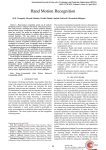
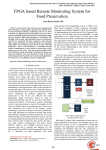
![Compression Test Machine Automation [CTM]](http://vs1.manualzilla.com/store/data/005689373_1-fbebbd60727252c31d96e8e1d4d5f20d-150x150.png)
